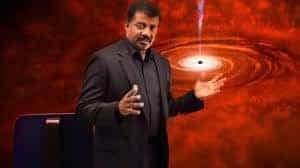 Like many of you, I watched the entire FOX series Cosmos for the last several weeks and which concluded this past Sunday.
Like many of you, I watched the entire FOX series Cosmos for the last several weeks and which concluded this past Sunday.
More than once I found myself in stunned awe of the incomprehensibly huge and old universe we live in, and how much science has been able to learn about it.
I felt the series was extremely well done, and very effective in communicating things we know and how much we don’t know and must, with humility, accept.
Though less prominent than with the original series (with Carl Sagan, which I also watched when it come out), there did seem to me to be an undercurrent of impatience with religion in general, or better with Christian fundamentalism in particular. I certainly get the frustration that people like Neil degrasse Tyson must feel toward the un-education represented by the pseudo-sceince of Creationism (a frustration also voiced by Bill Nye in his “debate” with Ken Ham a few months ago).
What disappointed me a bit, though, was how little awareness there seemed to be of how religious people, including Christians, genuinely synthesize cosmic, geological, and biological evolution in their thinking. I say “disappointed” but not really surprised, for I am not sure I expect a series like this to have its finger on the pulse on Christianity as a whole, especially given how much air time Creationism gets in the media.
Many Christians understand that the Bible does not give scientific explanations of physical origins but mythic explanations in keeping with ancient modes of thinking, and as such are not to be juxtaposed to scientific inquiry.
Still, the choice that seemed to be posed in the series was rather simplistic: between science and any sort of faith in a higher power, supreme being, whatever we want to call God. The reason for such a dichotomy seems to be the nearly total focus on the extreme of Creationism as a contrast to demonstrable scientific discoveries.
This dichotomy seemed peppered throughout the series; scientific advances vs. medieval and/or fundamentalist dogma. At each point, legions of Christian and other religious thinkers could have contributed to the discussion in ways that might have disarmed the simplistic view of religion of the series.
I would go so far as to say that the series had an agenda, though, again, more subtle than the original series, that science has dethroned religion and it is high time we all got over it. What clinched this perception for me was the commercial spot by Ron Reagan for the Freedom From Religion Foundation.
I know plenty of atheists and/or agnostics who genuinely feel, as Reagan does, that religious freedom includes no religion at all, and they are worried about a heightened rhetoric for “civil religion”–a syncretism of state and religion. I agree that history shows this combination rarely works well, and I would further contend that the New Testament has zero tolerance for such syncretism.
Having said that, airing this spot at the conclusion of the series, near the end of the last episode, not to mention Reagan’s (at least it appeared to me) condescending, smug tone, was hardly an accident, and suggests to me a proselytizing agenda. Perhaps I am overreading, but that’s what I came away with.
I wonder, too, if Sagan’s “Pale Blue Dot” soliloquy contributes to overall “we’re over religion” vibe. I’m not sure. Sagan’s speech is a moving, beautiful, sobering, and eloquent expression of the sad and triumphant human drama, one that Christian thinkers and theologians would do well to think through whenever they delude themselves with thoughts of absolute knowledge.
This cosmic perspective virtually reduces me to silence in my thinking about God, and, as Sagan says, makes we want to be kinder toward others, fellow residents on the earth, the only home we know.
Still, it’s hard to shake what many would call the absolute materialism of the speech and the series as a whole–as Sagan famously put it in the original, “The cosmos is all there is or was or ever will be.”
At any rate, I am not trying to stir a debate here between theism and atheism/agnosticism. I’m simply reflecting on a series I enjoyed tremendously, learned much from, but that also seemed to have a large blind spot about the existence religious people–including scientists–who have a more sophisticated view on religious matters.
I’m sure I’ll watch the series again on line and perhaps I’ll form a different opinion.
**************
Commenting Guidelines:
All comments are welcome–pro, con, or neutral–provided they are respectful and genuinely engage the post or a comment on the thread.
Badgering, abusive, nasty, mean, bullying, aggressive, disrespectful, baiting, insulting, etc. comments will be deleted and the commenter warned–once–and given the chance to try again (since there may be a good point behind the rough exterior). Commenters who supply a fictitious email address will be banned.
Long comments will be tolerated but only if they genuinely contribute to the discussion. I know some commenters have thought about some issues at length and have much of value to say. Having said that, lengthy comments should generally be avoided because few like to read them.
Also, though I do not respond to every comment, I read them all (except very long ones) and am thankful for opportunities to learn something new or see things from different angles. I believe we learn from each other.
